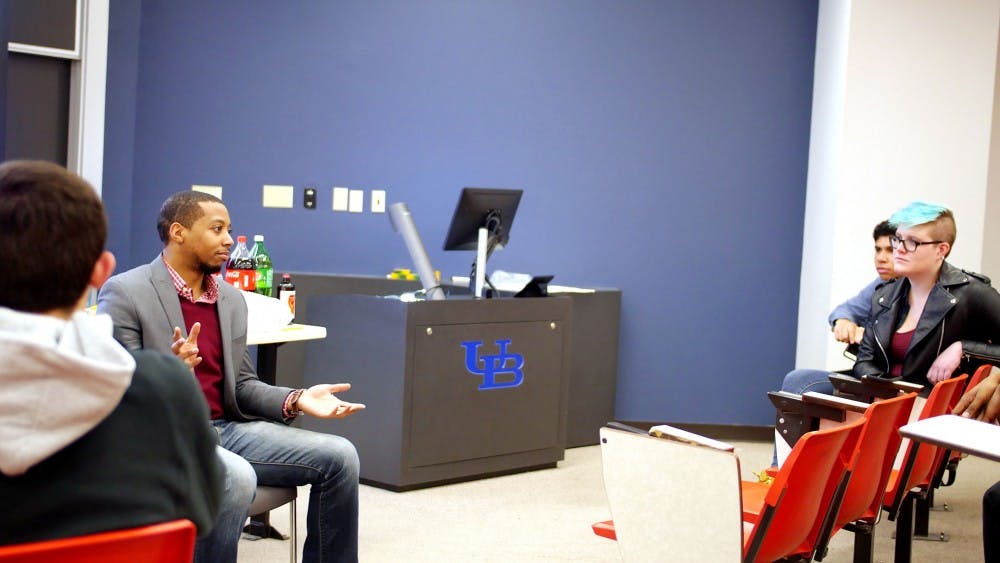For years, clubs UB Democrats, UB Republicans and Young Americans for Freedom have attracted like-minded students to discuss current events, but Harris Bresowsky, a senior international affairs and public policy major, felt students needed a non-partisan club on campus.
“I was walking by the Student Union one day on a Friday in December, and I saw a counter-protest group shouting ‘f**k immigrants.’ I just thought there had to be a better way than people shouting at each other. There had to be a way to have these people come together and start a dialogue,” Bresowsky said.
Bresowsky began a petition last spring with members from UB’s pre-law fraternity, Phi Alpha Delta, to create the Society for Politics and International Affairs.
Their goal is to create a space for “policy-oriented” conversations among students of all political affiliations. The club gained temporary status last fall, and since then has held several meetings, bringing out 15-30 students each time.
Vice President Elisha Jackson, an English and political science major, said the non-partisan nature of the club creates a more welcoming environment for students to learn and discuss what’s happening in the world.
“I think that sometimes it might be intimidating for somebody who leans to the left to go to a UB Republicans meeting, or it might be intimidating for somebody who identifies with UB Republicans or YAF to go to a UB Dems meeting; and, you know, that makes sense,” Jackson said. You’re walking into a room of people who have very different opinions than you, during a very polarized time, and people can get very hostile.”
So far, the club has held meetings focused on healthcare policy and the opioid crisis and is organizing a panel of political science professors to discuss the midterm elections. Club members also hope to debut a series of debates where students may compete for prizes.
The most recent meeting on March 26 focused on diplomatic relations in the Middle East and looked at an overview of U.S. involvement in the region.
“It was really great to see such a spirited and intellectual debate, and we’re looking forward to seeing more and more people get involved in future events,” said Gibson Katz, a sophomore political science major who attended the debate.
Similar non-partisan groups have succeeded in recent years on college campuses including U.C. Berkley, Columbia University and Georgetown University.
Club members say SPIA is also distinct in its focus: students aim to promote equal discussion of international and domestic politics through guest speakers, panels and student debates.
The club works closely with the political science department, but is hoping to attract a more diverse member base over time, Bresowsky said.
“We absolutely encourage students from every single background– whether it be engineering, whether it be arts, whether it be history – to come to our meetings,” Bresowsky said. “We want students from every single background to come, feel welcome and share their views on politics and what’s happening today across the country and throughout the world.”
Members like Yoseph Hamid, a sophomore political science major, said the club hopes to see attendance levels continue to rise as the temporary club becomes a more permanent fixture of student life.
Bresowsky said he thinks the current political climate is attracting student interest. “There are a lot of movements which are speaking to students these days,” Bresowsky said. “Bernie Sanders and Donald Trump [running as] anti-establishment [candidates] also got people more active because students nowadays, they care deeply about issues like free speech, free college tuition and universal healthcare.”
Still, the club hopes to have an enduring impact on UB student life and “transcend the current political moment,” according to Jackson.
“We don’t want to be just a ‘Donald Trump shouldn’t be president’ or ‘Hillary Clinton should have never been president’ type of club,” Jackson said.
The club’s next meeting is tentatively scheduled for the week of April 23, Bresowsky said.
Elizabeth Napolitano is a news staff writer and can be reached at news@ubspectrum.com
Elizabeth "Liz" Napolitano is the senior news editor for The Spectrum. She's an optimistic pessimist who found her love for journalism in Ecuador. She likes late night walks and reading Twitter threads in their entirety.





